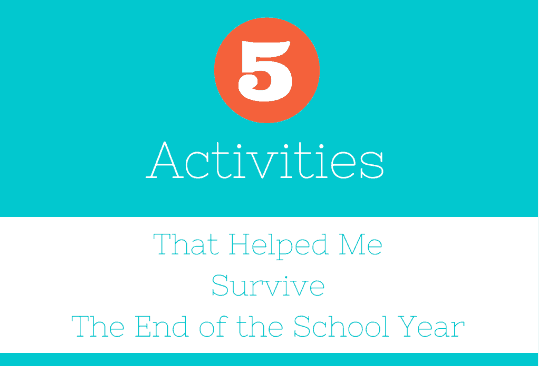Five Activities That Helped Me Survive the End of the School Year

Snow cones, slip ’n slides, and other summer staples may be on the horizon, but surviving those last days of the school year and all that it entails can feel simultaneously like a sprint… and a marathon… and one of those crazy color covered runs… all rolled into one. So, here are a few activities from my classroom time that helped me not only survive the end of year, but maybe even provided a head start on training for next year’s race.
1. Student Organizational Gurus
Judge me if you will, but I had some students that LOVED to help me organize and create systems for everything from my rubber bands and staples to math manipulatives and our class library–all as we were under deadline to get everything packed up on those last days.
I don’t think I am stretching too much to say I saw the continued development of problem solving, spatial reasoning, and good-ole organizational skills and habits forming for my students who took on these tasks. I certainly remember the little treasures found when unpacking the following year like the handwritten student note on my rubber band collection with a little smiley—“Have a great year! We will miss you! Love, Patty”.
2. Preview Challenging Content
Vertical planning may not supersede “getting horizontal” to avoid passing out from exhaustion in the last moments of the school year, but a quick, informal meeting could set the tone for a whole new round of students.
Ask the teachers in the grade level ahead of you what students often struggle with in the first weeks of school. Give students a little preview of the content, let them explore and make connections and ask questions in a pressure free zone.
If feasible, set up a time to visit the students who are coming up to your grade level and give them an overview of what to expect and things they can do to prepare.
3. Let Your Students Share Your Class Expectations
Creating a classroom culture takes time and a lot of energy. Let your students give you a hand by creating videos, blog posts, letters, or other projects to share what will be expected of your next group of students when they arrive.
My students made quick videos in the sharing a secret tone as we called it—whispering into the camera “secrets for success in Mrs. Clark’s 4th grade bilingual classroom”. It was pretty funny and actually quite reflective for me to hear what they took away from our classroom culture. Apparently, I was a stickler for positivity with several students ending the stem, “Whatever you do” with “don’t ever ever say I can’t…”
And my students the next year? They were way more attentive to this style of sharing success secrets than any list of expectations I could have made.
4. Curate Summer Content to Continue Learning
I remember the feeling of shock and awe when I got a message from one of my students the second week of summer asking me why I wasn’t updating our class website with new activities and learning links. Oh how we sometimes underestimate our learners!
So, instead of being surprised when your students actually want to continue learning, be one step ahead and provide lists of books, websites, videos, apps, or any content you think might be relevant to them as they spend their summer days looking for ways to occupy themselves.
Students can get involved by sharing their own favorites or collaborating to develop a class crowdsourced group of resources to share.
Here are some tool options that might help:
5. Create a Portfolio of Learning
I remember being frustrated by the fact that much of the work we accomplished in that year together would be summed up on a report card with a final grade and maybe a sentence or two of accompanying comments. My room would be empty and my students would move on to a whole other world (middle school).
Wanting more reflection, more emotional closure (at least for myself if not them too), more thinking about their learning, and hoping to inspire a new set of goals for the next year, I asked my students to put together a portfolio of their work (we had kept much of it throughout the year) accompanied by their thoughts on a couple of questions such as the following:
Portfolio Reflection Questions:
- What progress do you see in your work?
- How have you grown?
- What was the hardest thing for you?
- What work are you most proud of? What makes you say that?
- What was a challenge you persevered through?
- How do you think you got through that challenge?
- Would that strategy work if you got stuck on something in the future?
- What goals do you want to pursue next?
- What steps might you need to take to meet these goals?
These Moments Matter
During those final days of school, in between the Field Day events and the zoo field trip and the student placement meetings there is only so much one’s brain can handle. But these moments DO matter. So, may we not just survive the end of the school year, but use the last interactions with our students and colleagues to set the pace for next year’s race.
For more blogs by Tracy Morgan, check out:






0 Comments
Leave a Comment
Your email address will not be published. All fields are required.